Psychologists in the West Bank:
The occupation is a chronic
source of psychological trauma
Psychologists in the West Bank:
The occupation is a chronic source of psychological trauma
PALESTINE
Three Palestinian psychologists share their experiences working in the Israeli-occupied West Bank, navigating checkpoints and settler violence. They provide daily support to survivors of torture, trauma-affected children, and women subjected to violence.
PALESTINE
Three Palestinian psychologists share their experiences working in the Israeli-occupied West Bank, navigating checkpoints and settler violence. They provide daily support to survivors of torture, trauma-affected children, and women subjected to violence.
January 23, 2025
THE OCCUPIED WEST BANK: The car buzzed with excitement. The Rasras family was on their way to a wedding, looking forward to the celebration. Along the way, they mistakenly turned onto a road designated for Israeli settlers only. They wanted to turn around, but there was no place to make a U-turn. They had no choice but to continue to the military checkpoint. Nervousness spread throughout the car. Would they be allowed to turn around?
As soon as they arrived, the father stepped out of the car, hands raised, shouting that he had made a mistake and wanted to turn back. He was met by armed soldiers who spoke aggressively and pointed their weapons at the family. They searched the car while their dogs moved between the seats. The father explained that his daughter had a phobia of dogs, but the soldiers ignored him. The daughter began hyperventilating, so terrified that she nearly passed out.
The soldiers found nothing, and the family was allowed to turn around and head home.
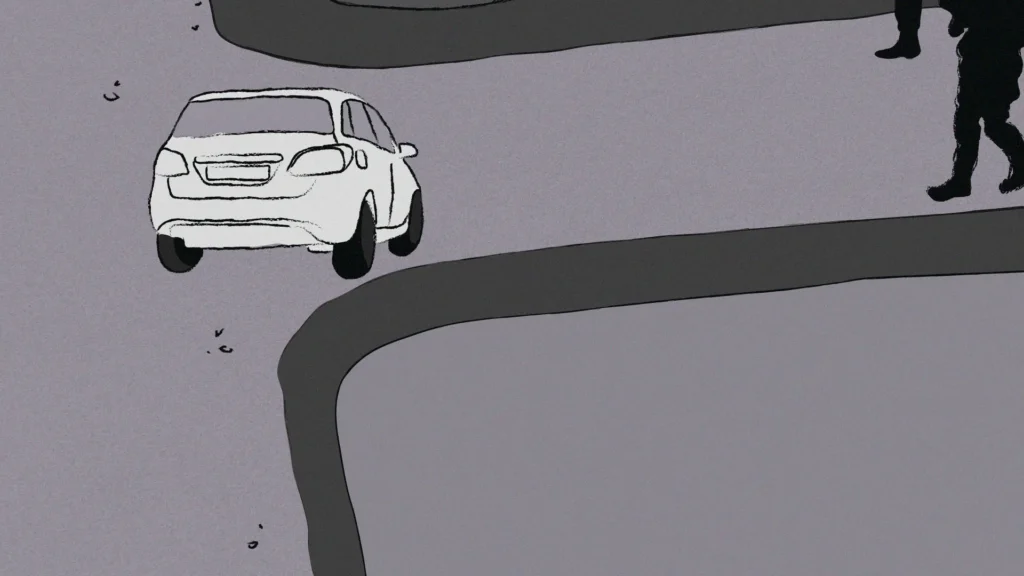
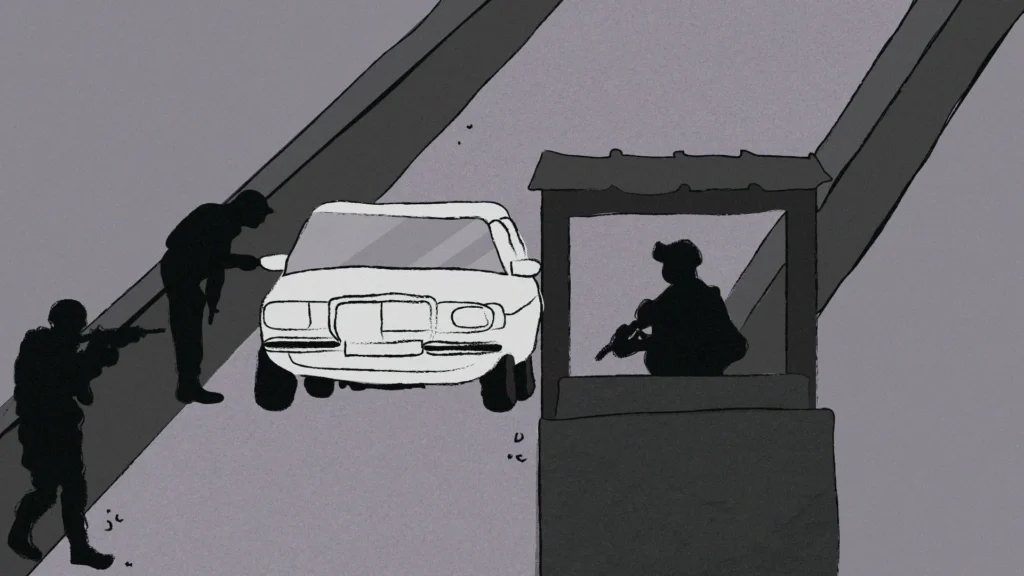
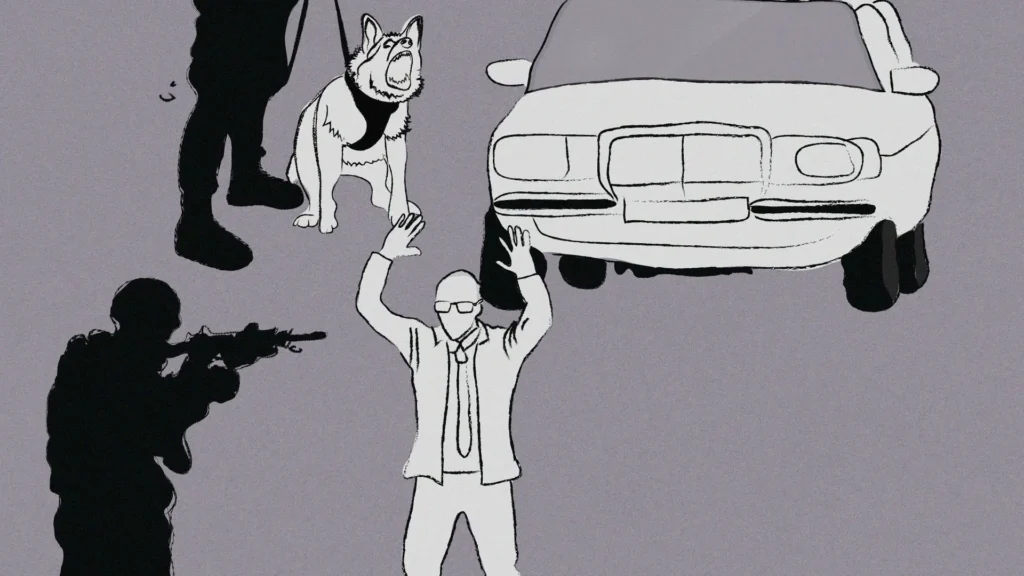
The father in this story is Dr. Khader Rasras, who, for over 30 years, has been one of the leading Palestinian voices in the fight against torture in the West Bank.
»That incident is nothing compared to the violence and humiliation Palestinians face at checkpoints. But even today, ten years later, my daughter still asks whenever we go out for a ride: »Dad, do you know the route? Do we know the right way, Dad?« Whenever we come to a sign, the whole family sticks their faces out and reads what it says. The trauma runs that deep«, says Dr. Khader.
»The occupation doesn’t just create the systematic violence that leads to trauma; it also sustains the trauma for the victim because the violence is everywhere. Checkpoints. Soldiers. Settlers. Separate roads. Military law. Home demolitions. Torture. Detentions. Uncertainty. Fear and years of displacement. All of this is physically present in our daily lives and serves as a constant reminder of the trauma, which becomes chronic and continuous«.
Focus on the victims
Dr. Khader is the director of DIGNITY’s partner organization, the Treatment and Rehabilitation Center for Victims of Torture (TRC), which provides specialized psychosocial support. Treatment and Rehabilitation Center for Victims of Torture operates several treatment centres in the West Bank, including East Jerusalem and Gaza, where they support survivors who have been subjected to torture and other inhumane treatment in prisons and detention centres. This also includes their families.

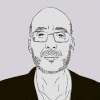
Dr. Khader began his work at Bethlehem’s psychiatric hospital in the early 1990s.
»When we talk about mental health in Palestine today, there is both a good and a bad story. Today, people are much more aware of the importance of mental health. The stigma surrounding mental health issues is still present, but it is getting better. The bad story is that the human rights violations by the settlers and Israeli soldiers, which we have lived under for decades, have only gotten worse and worse – especially in the past year. The personal sphere is gone, and violence is penetrating everywhere. Even those who are not political or part of any resistance movement are affected,« says Dr. Khader, pointing to the unpredictability that hangs heavily over the population’s daily life.
»Many of our patients are constantly anxious. Do the soldiers burst into your home and arrest your son? Is your husband killed in prison? Do settlers attack you today? We experience that our existence as Palestinians is threatened«, he says.
According to the UN Office for the Coordination of Humanitarian Affairs (OCHA), 732 Palestinians have been killed in the West Bank, including East Jerusalem, between the Hamas attack on October 7, 2023, and October 21 last year. During the same period, 23 Israelis, including 16 members of Israeli forces and six settlers, were killed. (The numbers are updated regularly here.)
Clashes between the Israeli military and Palestinian militant groups have intensified in the West Bank. This has coincided with a significant rise in settler attacks against Palestinian communities in the West Bank. More than 820 Palestinians in the occupied West Bank have been displaced due to violence, including settler attacks, since October 7, 2023, according to OCHA.
At the same time, the Palestinian Authority’s security service has launched a crackdown on militant groups in the West Bank.
»Before, we used to look forward to harvesting our olives, which is a Palestinian tradition. It is no longer the case; it has become a burden that we must quickly finish because we fear being attacked by armed settlers or soldiers. The economy is severely affected, people are afraid of losing their homes to settlers, and our ability to move from one town to another is extremely difficult. If you express your opinion on social media, you risk being arrested,« says Dr. Khader, who observes a direct response in his patients to the increased violence.
»We see a chronic traumatic stress reaction among many of our patients. When people feel safe, they can receive treatment and relax. It is difficult to live in the West Bank. Many have trouble sleeping, suffer from nightmares, and experience somatic issues, including back, stomach, and shoulder problems. The dominant trend is a deep sense of frustration, anxiety, and depression. They need specialized treatment. It is especially true for survivors of torture, whom we have been helping and treating for many years«.
Meet Dr. Khader:
DIGNITY trains Palestinian partners
DIGNITY has trained Treatment and Rehabilitation Center for Victims of Torture and The Palestinian Counseling Center ‘s psychologists in a group-based program called ‘Self-Help Plus’ (SH+). The program, developed by the World Health Organization WHO, consists of five weekly sessions focused on managing stress and maintaining mental health, including preventing burnout. After brief training—typically 5 days—participants can deliver a supervised intervention to groups of up to 30 people. The two Palestinian organizations are now working with SH+ and adapting the approach to their context, incorporating movement, music sessions, and communal meals.
Widespread incarceration
The use of torture and other inhuman treatment against imprisoned Palestinians has also escalated in the past year.
»In most homes, you will find someone who has either been imprisoned by the Israeli military, arrested or who is related to someone who has been. We are seeing more and more survivors of torture. Many have been beaten and subjected to stress positions. We are also seeing more and more psychological torture, such as sleep deprivation and humiliations that do not leave physical scars. There are also examples of children and young people being arrested and imprisoned«, says Dr. Khader and continues:
»Large parts of our society have been imprisoned. The Israeli prison system – where many are administratively detained without trial – is destructive. It negatively impacts the families when, for example, the father is in prison; it harms the family’s relationships, it damages their economy, and it affects their social network. People come out of prisons marked if they even come out«.
It is estimated that over 800,000 Palestinian men and women from the West Bank and Gaza have been imprisoned since 1967. Currently, 10,091 are imprisoned, including 3,443 who are ‘administratively detained’ without trial.
»We treat torture survivors and try to reintegrate them back into society and their families. Many of them have been imprisoned for many years. When they are released from prison, they often have difficulty re-entering their old roles in the family because the mother has typically played the role of both the mother and father. The children are used to consulting their mothers about everything. This is where we come in – in addition to providing therapy for the survivor – we actively work with the whole family and try to restore balance and reintegrate the father into the family«, Dr Khader explains.
The Occupied Palestinian Territories
Israel has occupied the West Bank, including East Jerusalem and Gaza– collectively known as the Occupied Palestinian Territories (OPT) – since 1967. According to an advisory opinion from the International Court of Justice (ICJ), Israel’s occupation of Palestinian territories is illegal. The Court also held Israel responsible for racial segregation and apartheid.
Collective trauma
The need for psychosocial interventions in the occupied Palestinian territories has long been urgent and extensive – even before October 7, 2023. This is not only the case for survivors of torture. According to a 2022 report by Save the Children, four out of five children in Gaza suffer from depression, grief, and fear, and three out of five children are self-harming. More than half of Gaza’s children had at that time contemplated suicide. The same year, a report from the World Bank revealed that over half of the adult Palestinian population had been screened positive for depression. In Gaza, the figure was 71 per cent, while in the West Bank, it was 50 per cent. The UN children’s agency, UNICEF, estimates that nearly all of Gaza’s 1.2 million children need psychosocial support (MHPSS).
»I do not doubt that the numbers are higher today. This also applies to other symptoms. Psychology refers to PTSD. But in the West Bank – where trauma happens again and again – we speak of CTSD, which can be translated as Chronic Traumatic Stress Disorder«, says Dr. Khader.
One of the psychologists who works daily with trauma-affected Palestinians is Noor Hayamel.


»I visit children and families, offering our help and support. This can include things like psychological first aid«.
»We provide them with tools to cope with nightmares and panic attacks and try to create a sense of safety around them through therapy and breathing exercises. It’s hard when they don’t feel in control of their lives, and an Israeli soldier can invade their home at any moment. The trauma is collective and is passed down from generation to generation«.
Schoolchildren’s Health
Treatment and Rehabilitation Center for Victims of Torture’s psychologists also visit schools and offer group therapy and support to the children. Sometimes, they are accompanied by a doctor, nurse, or physiotherapist.
»Very few children are unaffected by the current situation in one way or another. Some have an imprisoned father and live alone with their mother. Some have lost a brother or sister. Many of the children I treat are anxious, depressed, and acting out«, says Noor Hayamel, highlighting a seven-year-old boy she has been treating for an extended period.
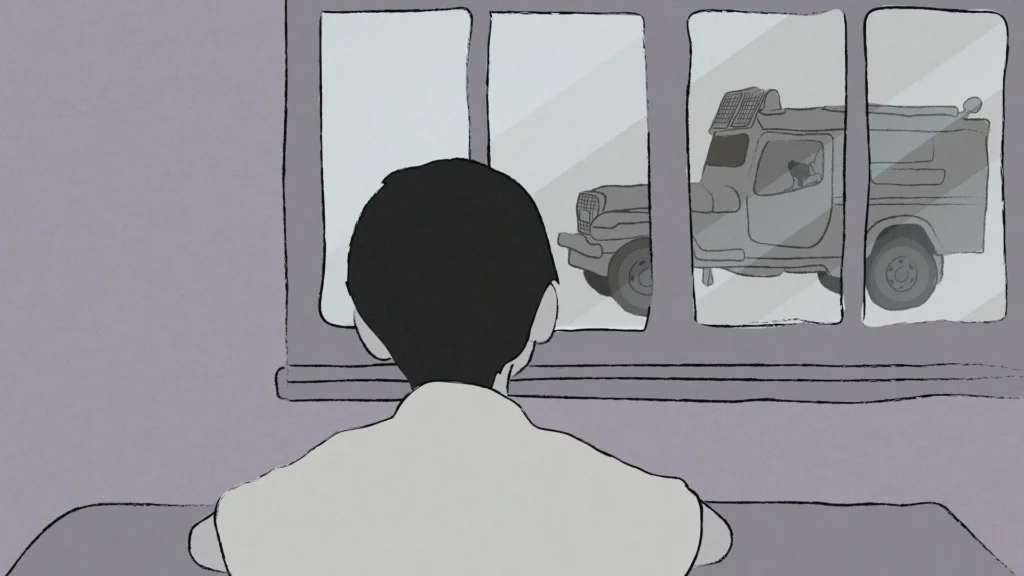
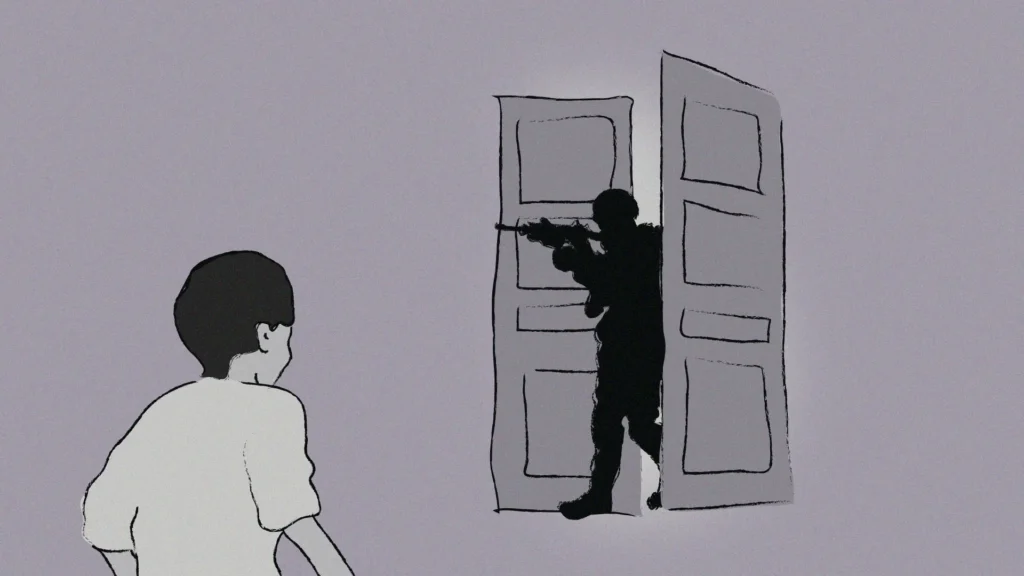
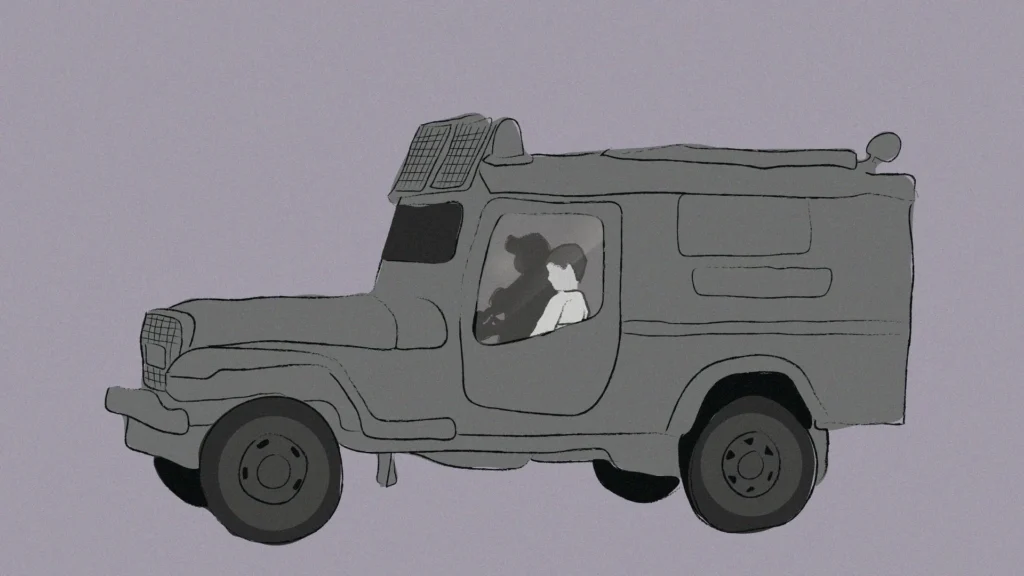
One day, the boy was sitting by a window, looking out at the Israeli soldiers passing by. The soldier spotted him and pointed his weapon at him. Shortly after, the soldiers broke down the door and dragged the boy into a military jeep. The boy sat alone with the soldiers in the jeep before they let him go again.
After the incident, the boy lost the ability to speak for a week. He experienced constant anxiety and was afraid to go to the toilet. As a result, he often wet himself. He didn’t want to go to school and went from being a happy boy to being withdrawn and fearful.
»I visited the family and worked with the mother for a long time to gain the boy’s trust. We started by drawing together. One of the boy’s first drawings was of the military jeep and the Israeli soldier. Slowly, we began to unravel the trauma and help him feel safe again. He didn’t want to sleep alone. The boy had also started hitting his siblings. I asked him why, and he answered that he wanted to defend himself, which he couldn’t do against the soldiers«.
Over time, the boy returned to school and could go out and play alone without his mother.
»Everything was going well with the boy until the Israeli soldiers returned to the family, and the boy’s nightmares started all over again. We were back to square one. So, we started over. The boy’s story represents what being a psychologist in Palestine is like. We cannot keep pace with the occupation. But we keep going. After each session, the families are grateful. I feel like I am making a difference. Just listening to a mother who has lost a son or daughter, who feels alone, makes the work meaningful«, says Noor Hamayel.
Meet Psychologist Noor Hamayel:
HOPE. »Just listening to a mother who has lost a son or daughter and feels alone makes the work meaningful«, says the psychologist, Noor Hamayel from Treatment and Rehabilitation Center for Victims of Torture.
Give the emotions a colour
One of the psychologists involved in home visits and at schools is Taline Toubassi, who explains that she primarily helps children regulate their emotions:
»Many children in 3rd to 6th grade in schools are struggling with trauma. We play together while practicing how to become more aware of our emotions and how to express them. For example, we have a game where we colour our emotions. We open up both dark and happy thoughts, and we do this once a week, where they talk about their feelings«, says Taline Toubassi, who also conducts group therapy in a safe house for women affected by violence.
Whether it’s torture survivors, children with trauma, or women affected by violence, Taline Toubassi emphasizes that particular group sessions have a positive effect.

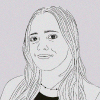
»Family, friends, and social networks are crucial for healing and getting better. We learn from each other’s experiences and are strengthened by each other’s stories and by the community. No matter how hard it has been, there’s a certainty that we will get through it together«.
Gaza Hotline
When Taline Toubassi arrives at work, she takes calls from Palestinians in the war-torn Gaza, where Treatment and Rehabilitation Center for Victims of Torture now also provides psychosocial support through a hotline.
»Some Gazans just want to talk to someone outside of Gaza, others want to discuss traumatic experiences, and we provide psychological first aid. Some say they don’t have food or a place to live, they’re missing diapers, women are missing sanitary pads, pregnant women lack milk, some have had their tents flooded, and others say family members have been killed and their homes bombed. It’s extreme. A conversation takes about half an hour, and we agree they’ll call back again. We listen and offer emotional support to a people living under daily Israeli bombardments«, says Taline Toubassi, adding that especially parents call in with questions about their children.
»They need help dealing with their children’s anxiety, anger, and general mental health. I try help as best as possible, guiding the family and giving them tools. I come up with games they can do together as a family. They are grateful. I spoke on the phone with a man from a refugee camp in Jabalia in northern Gaza the other day. He started praying for me from one of the most bombed and destroyed areas in the world. He needed that. I believe that human contact makes a difference for them«.
Initially, the hotline was open from 8 AM to 4 PM. Because communication is often disrupted and due to the high demand from trauma victims in Gaza, Treatment and Rehabilitation Center for Victims of Torture decided to the hotline to 8 AM to 6 PM, including Sundays. It is free to call in.
Both Dr. Khader, Noor Hamayel and Taline Toubassi emphasize that face-to-face therapy is far more effective, but it is not an option in Gaza. They also point out that their work makes an essential difference for trauma victims but that it is also can be exhausting.
»Sometimes it is difficult for us as psychologists to be in this situation. We often need help ourselves. We also live under occupation. We are also stopped at checkpoints. Our homes, friends, and families are also under threat. It is extremely difficult to create a safe environment when, in the end, we do not have control over our daily lives,« says Noor Hamayel.
Meet Psychologist Taline Toubassi:
CONTACT. »I believe that human connection makes a difference«, says the psychologist Taline Toubassi from Treatment and Rehabilitation Center for Victims of Torture.
Freedom
Although it is challenging to provide psychosocial support under military occupation in the Palestinian territories, the four psychologists have far from lost hope for a better future for their fellow citizens.
»The recent period has been dreadful. But what we are doing is important because it helps people with their acute needs and supports them daily. Our treatment and efforts focus on supporting people, their personalities, and their identity as Palestinians, so they don’t break down. It keeps families together so they can support each other and resist the enormous psychological pressure coming from the occupation to pack our things and disappear. We will not disappear. This is our home. Our efforts create hope for children and young people for a better future here. We help them keep their heads above water,« says Dr. Khader.
»But we cannot keep treating people without addressing the root of the problem. We need more training and want to reach even more and help them with more resources and the latest knowledge. But what we really need, and what helps with the widespread psychological suffering, is for the Israeli occupation to end so we can be free like all other people in the world and the Palestinians can regain control over their own lives and future. That is what we need help with. To uphold human rights. It is not just a task for us Palestinians. It is a task we must tackle together on a global scale. This is how the world can best support us, allowing us to heal both mentally and physically«, he says and concludes:
»So we can regain control and the spontaneity in our lives, which is currently gone. The ability to start the car and take a pleasant trip with the family without fearing what awaits me on the other side of a wrong turn. That is freedom«.
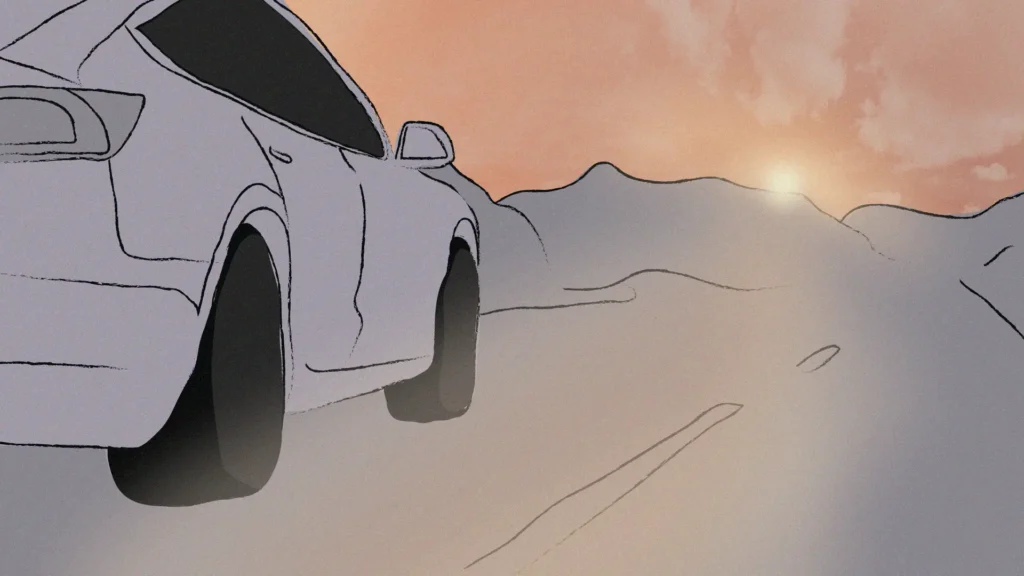
DIGNITY met with The Palestinian Counseling Center and The Treatment and Rehabilitation Center for Victims of Torture in Amman, Jordan, where these interviews for the article were conducted.
How DIGNITY collaborates with Treatment and Rehabilitation Center for Victims of Torture
DIGNITY collaborates with Treatment and Rehabilitation Center for Victims of Torture and The Palestinian Counseling Center to address the immense need for psychosocial support among Palestinians exposed to torture and other forms of violence in Gaza and the occupied West Bank, including East Jerusalem. This is done through treatment programs for traumatized victims of war, displacement, violence, and torture, as well as for their families. Additionally, DIGNITY provides clinical support to the organization’s clinical teams through training courses in various clinical methods and interventions. DIGNITY has been working with Treatment and Rehabilitation Center for Victims of Torture and The Palestinian Counseling Center since January 2023. The work is supported by the Danish Ministry of Foreign Affairs.






Read more about DIGNITY’s international programmes
DIGNITY –
Danish Institute Against Torture
Bryggervangen 55
2100 Copenhagen Ø
Phone: +45 33 76 06 00
[email protected]
CVR: 69735118
EAN: 5790000278114
Konto: 4183 4310821209